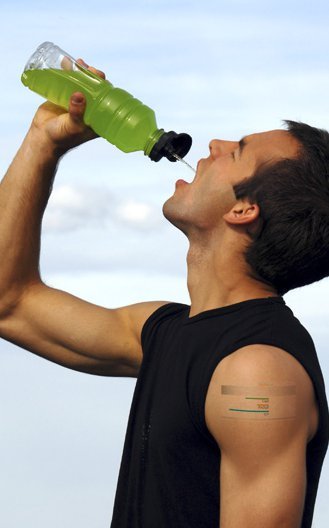The claims of sports products, such as drinks and footwear, suffer from a “striking lack of evidence” according to a new analysis of magazine advertising.
 The British study, published today in BMJ, reviewed 235 magazine advertised sports products (including oral sports drinks, oral supplements, footwear and clothing) and examined the evidence (or lack thereof) provided to back up any claims. The researchers searched web pages and contacted companies directly asking for any article or reports (peer-reviewed or unpublished) that substantiated their advertising claims.
The British study, published today in BMJ, reviewed 235 magazine advertised sports products (including oral sports drinks, oral supplements, footwear and clothing) and examined the evidence (or lack thereof) provided to back up any claims. The researchers searched web pages and contacted companies directly asking for any article or reports (peer-reviewed or unpublished) that substantiated their advertising claims.
Well-known sports brands such as New Balance, Gatorade, Nike, Asics, Powerade, Lucozade were among those scrutinised.
The quality of the few references that were provided was disturbingly poor, according the researchers, who state in the article:
“There is a striking lack of evidence to support the vast majority of sports-related products that make claims related to enhanced performance or recovery, including drinks, supplements and footwear. Half of all websites for these products provided no evidence for their claims, and of those that do, half of the evidence is not suitable for critical appraisal.”
The researcher also warned that the lack of reference to existing high quality research and systematic reviews makes it “virtually impossible for the public to make informed choice about the benefits and harms of advertised sports products based on the available evidence.”
Our colleagues at the UK SMC collected the following expert commentary. Feel free to use these quotes in your reporting. If you would like to contact a New Zealand expert, please contact the SMC (04 499 5476; smc@sciencemediacentre.co.nz).
Dr Graham Burge, Reader in Nutrition at University of Southampton said:
“This is a well-conducted study that shows that for a substantial number of products purported to enhance sports performance the evidence underpinning such claims is inadequate. This is a cause for concern as there is potential for the public to be misled or, perhaps more importantly, for harmful effects to go unreported. Unfortunately, the study stops short of calling for legislation to set standards for evidence to support claims related to enhanced sports performance which is needed if the interests of the public are to be protected”
Dr Colin Cable, Pharmaceutical Science Information Officer at the RPS:
” If consumers are to make informed choices when purchasing sporting drinks or supplements, evidence must be available to support any claims that are made by manufacturers.
“Although the extent of evidence required to support claims made for foods and dietary supplements is much less than for medicines, the evidence must be high quality, robust and sufficient to clearly demonstrate any beneficial effects.
“However, for the vast majority of sporting participants, it is questionable whether any form of supplementation will be necessary, as a healthy balanced diet will provide their body’s requirements for protein, carbohydrate, vitamins and minerals.”
Professor John Brewer, Head of Sport Science at the University of Bedfordshire, said
“There is a wealth of high quality scientific evidence supporting the sensible use of sports drinks and nutritional supplements in appropriate environments. Whilst those who exercise as a means of keeping fit and losing weight may find that water is a useful and simple means of staying hydrated and do not therefore require sports drinks, those who compete intensively for long durations have been show by numerous studies to improve their performance through the sensible consumption of sports drinks.
“It is essential that athletes who use sports supplements chose reputable manufacturers who can justify their claims with scientific evidence, and have their products screened to ensure they do not contain WADA banned substances.”